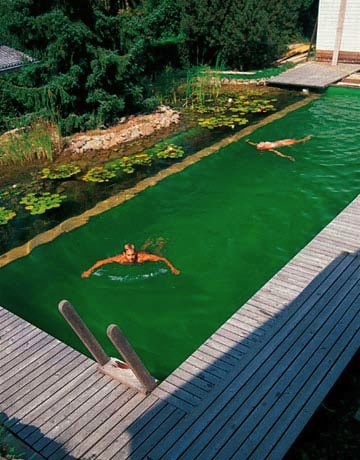Natural Swimming Pools
A backyard swimming pool can be an oasis of fun and relaxation in a busy, stressful world. Swimming in a pool is also a great form of exercise. All this fun and frivolity comes at a cost; the chlorine and other chemicals necessary to keep a pools' water clean and safe can have some pretty ugly side effects.
Chlorinated pool water, especially water that is over chlorinated, can damage swimmers' hair, and lead to skin irritation. Some studies have linked chlorine to increased asthma rates.
For this reason, or even just to avoid the chlorine smell of pools or damage to swimwear, many have started to seek out more natural ways to clean pool water, such as salt water pools .
"Natural" Swimming Pools
One interesting natural solution, popular in Europe for quite awhile and just starting to gain popularity here in the States, is the natural swimming pool. The 21st century equivalent of the old swimmin' hole, natural pools (also referred to as swimming ponds, green pools, or organic pools) mimic nature to create a safe swimming environment.The natural swimming pool, when managed properly, completely eliminates the use of toxic chemicals. By eliminating chemicals, maintenance and upkeep costs are lower; installing a natural pool doesn't cost much more than a traditional pool.
How a Natural Swimming Pool Works
Though their design and materials used can vary by manufacturer, the theory behind all natural pools is the same: a swimming area lined with rubber or polyethylene with a separate area containing aquatic plants which filter and clean the water. These water-loving plants contain species such as cannas, dwarf horsetail, water cress, pennywort, rushes, and umbrella palms, among many others. The result is a gorgeous garden that attracts wildlife and beneficial insects, while also working to keep the pool water clean and safe.Often, natural pools incorporate waterfalls or fountains into their design as decorative features as well as to aerate the water. Moving water also keeps mosquitoes at bay.Some natural pool designs add UV light to sterilize the water in order to assure the total elimination of germs and harmful bacteria. Skimmers can also be added to pick up larger things like leaves and dead bugs.
Traditional pools use chlorine and other hazardous chemicals as a blunt weapon to keep pool water "dead", but nature always finds a way in, making constant maintenance and proper chemical levels mandatory. A natural pool is a living system, and keeps itself clean. In other words, while the chlorinated pool kills all the bugs, in the natural pool the good bugs take care of the bad ones.
How are Natural Pools Different?
Designing and building a natural pool takes some skill to make sure the water is circulating just right, to keep the water clean. Natural pools often have a 'break-in' period, as the plants become established, and the natural system achieves balance. During this time, occasional growths of algae may slightly discolor the water, but it remains safe for swimming.Unlike natural bodies of water, like ponds and lakes, that can become murky from nutrient overloading and sediments leaking into the water from groundwater sources, the natural pools' liner keeps it clear.




































































